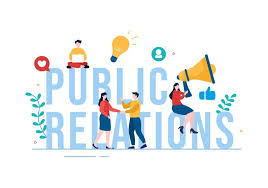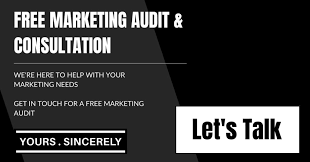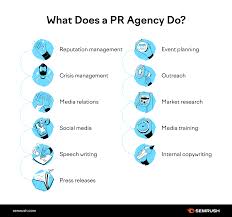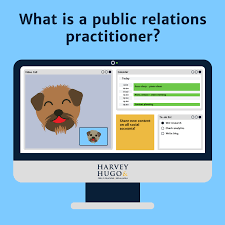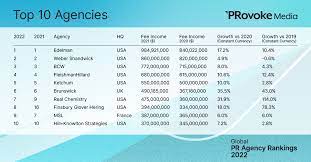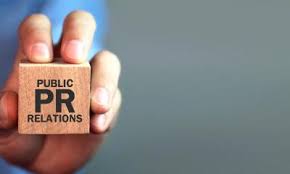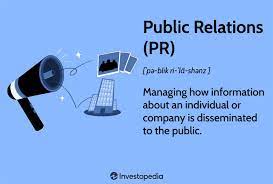Public Relations Agency: Building Bridges and Shaping Perceptions
In today’s fast-paced and interconnected world, effective communication is vital for businesses to thrive. This is where a public relations (PR) agency comes into play. A PR agency acts as a bridge between organizations and their target audience, helping to shape perceptions, manage reputations, and ultimately drive success.
At its core, a PR agency is dedicated to crafting and delivering strategic communication campaigns that align with the goals and values of its clients. By leveraging various channels such as media relations, social media, events, and content creation, PR agencies work tirelessly to ensure that their clients’ messages are heard loud and clear.
One of the primary functions of a PR agency is to generate positive media coverage for its clients. Through strong relationships with journalists and media outlets, PR professionals have the expertise to craft compelling stories that resonate with the intended audience. By securing valuable press coverage in relevant publications or securing interviews on influential platforms, PR agencies help businesses gain visibility and credibility in their industry.
But it doesn’t stop there. A good PR agency understands that effective communication goes beyond just getting media attention. It involves building thought leadership by positioning key individuals within an organization as experts in their field. Through targeted messaging and strategic content creation, PR agencies help establish their clients as trusted authorities within their industry. This not only enhances brand reputation but also opens up opportunities for speaking engagements, partnerships, and collaborations.
Another crucial aspect of a PR agency’s role is crisis management. In today’s digital age where news spreads like wildfire on social media platforms, organizations need to be prepared for any potential reputational threats or crises that may arise. A skilled PR agency can help navigate through challenging situations by providing timely advice, developing crisis communication strategies, and ensuring transparency throughout the process. By effectively managing crises, a PR agency helps protect its clients’ brand image and rebuild trust when faced with adversity.
Furthermore, a PR agency can assist with stakeholder engagement and relationship building. By identifying key influencers, industry leaders, and potential partners, PR professionals can create meaningful connections that support business growth. Whether it’s organizing events, facilitating collaborations, or managing community outreach programs, a PR agency helps foster positive relationships that contribute to long-term success.
In conclusion, a public relations agency plays a crucial role in today’s business landscape. By providing strategic communication counsel and executing targeted campaigns, PR agencies help businesses build strong brands, manage reputations, and connect with their audience in meaningful ways. From generating media coverage to crisis management and stakeholder engagement, the expertise and guidance of a PR agency can make all the difference in achieving communication goals and driving overall success.
9 Key Benefits of Hiring a Public Relations Agency in the UK
- Access to specialist expertise and knowledge in PR, marketing and communications.
- Ability to reach a wider audience with creative campaigns.
- Cost-effective way of managing PR activities for businesses of all sizes.
- Opportunity to develop relationships with key stakeholders, industry influencers and the media.
- Professional approach to dealing with potential issues that may arise in the public domain or on social media platforms.
- Expert advice on how best to manage reputation and brand image in a positive light for maximum effect.
- Proactive response to any negative press coverage or customer feedback that may occur online or offline, helping protect the company’s reputation and brand identity from damage by responding quickly and professionally before any further damage is done..
- Support in developing effective communication strategies tailored specifically for your business needs, ensuring you are getting maximum value from your PR activities while achieving desired objectives at minimal cost..
- The ability to track results through analytics tools such as Google Analytics, allowing you to easily measure ROI on your PR efforts over time
7 Cons of Working with a Public Relations Agency in the UK
- High cost – PR agencies can be expensive and may not always deliver the desired results.
- Lack of control – When working with a PR agency, you may have less control over the outcomes than if you handled it yourself.
- Time consuming – Working with a PR agency can be time consuming as they may not understand your business or industry as well as you do, leading to delays in getting campaigns off the ground.
- Limited reach – Depending on the size and budget of your campaign, a PR agency may not be able to reach out to all potential audiences or customers that you need them to reach out to.
- Lack of transparency – It can sometimes be difficult for clients to know exactly what their money is being spent on when working with a PR agency, which can lead to frustration and distrust between both parties if there is no clear communication from the start about where funds are going and how they are being used.
- Long-term commitment – Working with a PR agency often requires long-term commitments that some businesses may not want or need at certain times in their growth cycle, making it difficult for them to commit for extended periods of time without seeing any immediate benefits from it right away.
- Conflict of interest – If your company has competitors in the same space, working with an external public relations firm could create conflicts of interest if they also work with those competitors at any point during your relationship together
Access to specialist expertise and knowledge in PR, marketing and communications.
Access to Specialist Expertise: The Power of a Public Relations Agency
In the fast-paced world of business, having access to specialist expertise and knowledge is invaluable. This is where a public relations (PR) agency truly shines. With their in-depth understanding of PR, marketing, and communications, these agencies bring a wealth of expertise to the table.
One of the key advantages of working with a PR agency is tapping into their specialist knowledge. PR professionals have dedicated their careers to mastering the art of strategic communication. They possess a deep understanding of media landscapes, audience dynamics, and effective messaging techniques.
By partnering with a PR agency, businesses gain access to this valuable pool of knowledge. Whether it’s crafting compelling press releases, developing engaging social media campaigns, or creating impactful content, PR agencies have the skills and insights to deliver results.
Furthermore, PR agencies stay up-to-date with the latest trends and best practices in the industry. They continuously monitor changes in consumer behavior and media consumption patterns. This means that they can adapt strategies accordingly and ensure that their clients’ messages are delivered through the most effective channels.
Another advantage is that PR agencies often have niche expertise in specific industries or sectors. They understand the unique challenges and nuances that businesses face within those fields. This specialized knowledge allows them to tailor communication strategies specifically for those industries, ensuring maximum impact and relevance.
Moreover, working with a PR agency provides access to a diverse team of professionals with varied skill sets. From media relations specialists to content creators and digital marketing experts, these agencies bring together talented individuals who excel in their respective areas. This collaborative approach ensures that businesses receive comprehensive support across multiple facets of communication.
The benefits extend beyond just day-to-day operations as well. When unexpected challenges arise or crises occur, having a PR agency by your side can be invaluable. Their experience in crisis management enables them to respond swiftly and effectively to protect reputations and guide businesses through difficult times.
In conclusion, partnering with a PR agency grants businesses access to specialist expertise and knowledge in PR, marketing, and communications. From strategic planning to execution, these agencies bring a wealth of experience and insights that can elevate brands, engage audiences, and drive success. By leveraging their expertise, businesses can navigate the ever-changing communication landscape with confidence and achieve their goals effectively.
Ability to reach a wider audience with creative campaigns.
Public Relations Agency: Reaching a Wider Audience with Creative Campaigns
In the realm of business and communication, one of the key advantages offered by a public relations (PR) agency is its ability to reach a wider audience through creative campaigns. By employing innovative strategies and leveraging various platforms, PR agencies can help businesses expand their reach and connect with diverse target markets.
One of the primary ways in which a PR agency achieves this is through the development and execution of creative campaigns. These campaigns are carefully crafted to capture attention, spark interest, and leave a lasting impression on the intended audience. By thinking outside the box and tapping into their creativity, PR professionals can design unique campaigns that stand out amidst the noise of today’s media landscape.
With their deep understanding of different communication channels, PR agencies have the expertise to tailor campaigns for maximum impact. Whether it’s crafting engaging press releases, organizing eye-catching events, or creating compelling social media content, these agencies know how to effectively utilize each platform to reach specific demographics and target markets.
Moreover, PR agencies have established relationships with journalists, influencers, bloggers, and other key players in the media industry. This network allows them to amplify their clients’ messages by securing valuable media coverage across various outlets. By strategically placing stories in relevant publications or arranging interviews with influential individuals, PR agencies ensure that their clients’ messages are disseminated to a wider audience.
In addition to traditional media channels, PR agencies also harness the power of digital platforms. With social media playing an increasingly significant role in communication today, these agencies excel at creating viral-worthy content that captures attention online. From engaging videos and captivating visuals to interactive campaigns and thought-provoking hashtags, PR professionals know how to leverage digital platforms to extend their clients’ reach far beyond traditional boundaries.
By reaching a wider audience through creative campaigns, businesses can increase brand awareness and attract new customers. A well-executed campaign has the potential to generate buzz around a product, service, or brand, leading to increased visibility and ultimately driving growth.
In conclusion, the ability of a public relations agency to reach a wider audience through creative campaigns is a significant advantage for businesses. By employing innovative strategies and leveraging various communication channels, PR agencies can effectively capture attention, engage with diverse target markets, and amplify their clients’ messages. Through their expertise in crafting unique campaigns and their network of media contacts, these agencies help businesses expand their reach and achieve their communication goals in an increasingly competitive landscape.
Cost-effective way of managing PR activities for businesses of all sizes.
Public relations (PR) activities are essential for businesses to build brand awareness, manage their reputation, and connect with their target audience. However, many businesses, especially smaller ones, may struggle with the financial resources and expertise needed to effectively manage their PR efforts. This is where a public relations agency can provide a cost-effective solution.
A PR agency offers a team of experienced professionals who specialize in various aspects of strategic communication. By outsourcing PR activities to an agency, businesses can access a wide range of skills and expertise without the need to hire and train an in-house team. This not only saves costs associated with recruitment but also eliminates ongoing expenses such as salaries, benefits, and office space.
Moreover, a PR agency has established relationships with media outlets and journalists. They have the knowledge and network to effectively pitch stories and secure media coverage for their clients. By leveraging these connections, a PR agency can generate valuable exposure for businesses at a fraction of the cost it would take to build those relationships independently.
In addition to media relations, a PR agency can also handle other important aspects of communication such as content creation, social media management, event coordination, and crisis management. These agencies often have access to tools and resources that facilitate efficient execution of these activities. By tapping into these resources through an agency partnership, businesses can save on expenses related to software licenses or subscriptions.
Furthermore, working with a PR agency allows businesses to benefit from strategic guidance tailored specifically to their needs. The expertise of PR professionals helps ensure that communication efforts are targeted and aligned with business objectives. This prevents wasteful spending on ineffective strategies or campaigns that may not resonate with the intended audience.
Ultimately, partnering with a public relations agency provides businesses of all sizes with access to cost-effective solutions for managing their PR activities. By outsourcing these functions to experts in the field, companies can reap the benefits of professional communication strategies without the burden of extensive financial investments. Whether it’s generating media coverage, building thought leadership, or managing crises, a PR agency offers a smart and efficient way to achieve communication goals while maximizing resources.
Opportunity to Develop Relationships with Key Stakeholders, Industry Influencers, and the Media
In today’s competitive business landscape, building strong relationships with key stakeholders, industry influencers, and the media is crucial for success. This is where a public relations (PR) agency shines by offering businesses the opportunity to connect and engage with these important entities.
A PR agency acts as a facilitator, helping organizations establish meaningful relationships with stakeholders who have a vested interest in their success. These stakeholders can include customers, employees, investors, suppliers, and even the local community. By understanding their needs and expectations, PR agencies can develop tailored communication strategies that effectively engage these groups. This allows businesses to build trust, loyalty, and support among their stakeholders.
Industry influencers are individuals or organizations that hold significant sway within a specific sector. They have the power to shape opinions and trends. PR agencies excel at identifying these influencers and creating opportunities for collaboration or endorsement. By connecting with industry influencers through strategic partnerships or thought leadership initiatives, businesses can gain credibility within their field. This opens doors for networking opportunities, speaking engagements at industry events, and exposure to wider audiences.
The media plays a pivotal role in shaping public opinion and disseminating information. PR agencies have established relationships with journalists and media outlets across various platforms – print, broadcast, online – enabling them to secure valuable media coverage for their clients. By crafting compelling stories that align with journalists’ interests or current trends in the news cycle, PR agencies help businesses generate positive publicity. This exposure not only enhances brand visibility but also builds credibility among target audiences.
Moreover, PR agencies understand how to navigate the complex media landscape effectively. They know how to pitch stories in a way that captures journalists’ attention and secures valuable coverage for their clients. Additionally, they can provide media training to key spokespersons within an organization so that they are well-prepared for interviews or press conferences.
In summary, one of the significant advantages of partnering with a PR agency is the opportunity to develop relationships with key stakeholders, industry influencers, and the media. Through their expertise and network, PR agencies help businesses connect with these important entities, fostering trust, credibility, and support. By building these relationships, businesses can enhance their reputation, increase brand visibility, and ultimately drive success in their respective industries.
Professional approach to dealing with potential issues that may arise in the public domain or on social media platforms.
Professional Approach: Navigating Potential Issues with Expertise
In the digital age, where news travels at lightning speed and social media platforms have become powerful arenas for public opinion, businesses must be prepared to handle potential issues that may arise in the public domain. This is where a public relations (PR) agency’s professional approach shines.
A reputable PR agency understands the importance of proactive issue management. They have a keen eye for identifying potential risks and are equipped with the expertise to navigate through challenging situations. By staying ahead of the curve, PR professionals can develop effective strategies to address issues before they escalate, mitigating any negative impact on their clients’ reputation.
When it comes to dealing with potential issues in the public domain or on social media platforms, a PR agency brings invaluable experience and insights to the table. They have a deep understanding of how online conversations unfold and can swiftly respond to emerging concerns. By monitoring conversations, analysing trends, and engaging with stakeholders in real-time, PR professionals can shape narratives and steer discussions towards more positive outcomes.
A professional approach means that a PR agency takes a strategic and measured approach to addressing potential issues. Rather than reacting impulsively or defensively, they carefully assess the situation, gather relevant information, and develop well-thought-out responses. This ensures that their clients’ messages are conveyed effectively while maintaining transparency and credibility.
Moreover, a PR agency’s professional approach extends beyond just crisis management. They work closely with their clients to establish robust communication protocols and guidelines in advance. By proactively identifying potential pitfalls and developing crisis communication plans, PR professionals empower businesses to respond swiftly and effectively when faced with unexpected challenges.
The value of a professional approach becomes even more apparent when it comes to handling issues on social media platforms. With millions of users actively sharing opinions online, it is crucial for businesses to address concerns promptly while maintaining brand integrity. A PR agency’s expertise in social media management enables them to monitor conversations across various platforms, engage with users in a timely manner, and defuse potential issues before they escalate.
In summary, a professional approach to dealing with potential issues is a significant advantage of partnering with a PR agency. Their expertise in issue management allows businesses to navigate through challenging situations with confidence. By proactively addressing concerns, shaping narratives, and maintaining transparency, PR professionals help protect their clients’ reputation and build trust among stakeholders. In an ever-connected world where public perception can make or break a brand, the professional approach of a PR agency is an invaluable asset for businesses seeking to thrive in the public domain and on social media platforms.
Expert advice on how best to manage reputation and brand image in a positive light for maximum effect.
Expert Advice: Maximizing Reputation and Brand Image through PR Agencies
In today’s competitive business landscape, a positive reputation and strong brand image are essential for success. This is where the expertise of a public relations (PR) agency shines. A key advantage of working with a PR agency is their ability to provide expert advice on managing reputation and brand image in a positive light for maximum effect.
PR agencies have a deep understanding of the intricacies involved in shaping public perception. They possess the knowledge and experience to develop comprehensive strategies that align with an organization’s values and goals. By conducting thorough research, PR professionals can identify the key attributes that differentiate a brand from its competitors, allowing them to craft messages that resonate with target audiences.
One of the primary benefits of engaging a PR agency is their ability to provide objective insights. Being external to the organization, PR professionals bring fresh perspectives and unbiased opinions. They can identify potential vulnerabilities or areas for improvement in an organization’s reputation or brand image, enabling proactive measures to be taken.
PR agencies are skilled at crafting compelling narratives that capture attention and evoke positive emotions. They understand how to communicate key messages effectively across various channels, whether it be through media relations, social media platforms, or other forms of content creation. By leveraging their expertise in storytelling, PR professionals can shape perceptions in a way that aligns with an organization’s values and resonates with its target audience.
Furthermore, PR agencies excel at crisis management. In today’s digital age where news spreads rapidly across social media platforms, organizations need to be prepared for potential reputational threats or crises. A PR agency can develop robust crisis communication strategies that help mitigate damage and protect brand reputation during challenging times. Their experience in handling crises allows them to provide timely advice on how best to navigate through difficult situations while maintaining transparency and trust.
Working with a PR agency also provides access to an extensive network of media contacts and industry influencers. These relationships are invaluable when it comes to securing positive media coverage and building thought leadership. PR professionals can leverage their connections to secure interviews, feature articles, or speaking opportunities for key individuals within an organization. This exposure not only enhances brand reputation but also positions the organization as a trusted authority in its industry.
In conclusion, engaging a PR agency offers the advantage of expert advice on managing reputation and brand image in a positive light for maximum effect. By leveraging their knowledge and experience, PR professionals can provide objective insights, craft compelling narratives, and navigate through crises effectively. Their ability to connect with media outlets and industry influencers further enhances an organization’s visibility and credibility. With the guidance of a PR agency, businesses can build a strong reputation, shape positive brand perceptions, and ultimately achieve long-term success.
Proactive response to any negative press coverage or customer feedback that may occur online or offline, helping protect the company’s reputation and brand identity from damage by responding quickly and professionally before any further damage is done..
Proactive Reputation Management: How a PR Agency Safeguards Brand Identity
In today’s digital age, where information spreads rapidly across various platforms, negative press coverage or customer feedback can pose a significant threat to a company’s reputation and brand identity. However, with the support of a proactive public relations (PR) agency, businesses can effectively manage and protect their image from potential damage.
One of the key advantages of partnering with a PR agency is their ability to respond swiftly and professionally to any negative press coverage or customer feedback that may arise. Whether it’s online criticism on social media platforms or offline incidents reported in traditional media, a PR agency acts as the first line of defense, ensuring that any potential harm is mitigated promptly.
By closely monitoring online conversations and media coverage related to their clients, PR agencies have their finger on the pulse of public opinion. This allows them to identify potential issues before they escalate into full-blown crises. With their expertise in crisis management, PR professionals are well-equipped to develop effective strategies that address concerns head-on while protecting the company’s reputation.
A proactive response from a PR agency can make all the difference in preventing further damage. By swiftly addressing negative press coverage or customer feedback, they demonstrate transparency and accountability on behalf of the company. This not only shows that the business values its customers but also helps regain trust and maintain positive relationships with stakeholders.
Moreover, a PR agency understands the importance of delivering responses in a professional manner. They ensure that all communications are sensitive to the situation at hand and aligned with the company’s values and messaging. By providing clear explanations, offering solutions where possible, and expressing genuine concern for any affected parties, PR professionals help navigate through challenging situations while upholding the company’s brand identity.
In addition to responding reactively to crises or negative feedback, a proactive PR agency also takes measures to prevent such incidents from occurring in the first place. They work closely with clients to develop crisis communication plans, establish robust social media monitoring systems, and conduct regular media training for key spokespersons. By being prepared and proactive, a PR agency helps minimize the likelihood of reputational damage and ensures that the company’s brand identity remains intact.
In conclusion, a proactive response to negative press coverage or customer feedback is a significant advantage of partnering with a PR agency. Their ability to swiftly address issues, provide professional responses, and protect the company’s reputation is invaluable in today’s fast-paced and interconnected world. By engaging with a PR agency, businesses can safeguard their brand identity, maintain positive relationships with stakeholders, and navigate through challenging situations with confidence.
Support in developing effective communication strategies tailored specifically for your business needs, ensuring you are getting maximum value from your PR activities while achieving desired objectives at minimal cost..
Supporting Your Business with Tailored Communication Strategies: The Value of a PR Agency
In the ever-evolving world of business, effective communication is essential for success. However, developing and executing a comprehensive communication strategy can be a daunting task. This is where a public relations (PR) agency shines, providing invaluable support in crafting tailored strategies that align with your business needs and objectives.
A reputable PR agency understands that one size does not fit all when it comes to communication strategies. They take the time to thoroughly understand your business, target audience, and industry landscape. By conducting in-depth research and analysis, they can identify key messaging opportunities and tailor their approach to meet your specific requirements.
By leveraging their expertise, a PR agency ensures that you are getting maximum value from your PR activities. They have a deep understanding of various communication channels and know which ones will yield the best results for your business. Whether it’s media relations, social media engagement, content creation, or event management, they have the knowledge and experience to guide you towards the most effective tactics.
Moreover, a PR agency helps you achieve desired objectives at minimal cost. With their industry insights and established relationships with media outlets and influencers, they can secure valuable coverage without breaking the bank. They know how to craft compelling stories that resonate with journalists and target audiences alike, ensuring that your message reaches the right people at the right time.
A PR agency also brings fresh perspectives to the table. As external experts who are constantly monitoring industry trends and best practices, they can offer innovative ideas that may not have been considered internally. Their objective viewpoint allows them to identify unique angles or opportunities for your business to stand out from the competition.
Furthermore, partnering with a PR agency provides access to a team of skilled professionals who are dedicated to driving your success. From strategists and media relations specialists to content creators and event planners, they work collaboratively to develop cohesive campaigns that deliver results. This allows you to focus on other aspects of your business while knowing that your communication efforts are in capable hands.
In conclusion, a PR agency offers invaluable support in developing effective communication strategies tailored specifically to your business needs. By leveraging their expertise and industry insights, they ensure that you are getting maximum value from your PR activities while achieving desired objectives at minimal cost. With their fresh perspectives and dedicated team, a PR agency becomes a valuable partner in driving your business forward through strategic and impactful communication.
The Power of Data: Measuring PR Success with Analytics
In the dynamic world of public relations, tracking and measuring the effectiveness of campaigns is crucial. This is where the power of analytics comes into play, offering valuable insights and allowing businesses to easily measure their return on investment (ROI) for their PR efforts over time. With the help of tools like Google Analytics, a public relations agency can provide clients with a comprehensive view of the impact their PR activities are having on their business.
One significant advantage of working with a PR agency that utilizes analytics tools is the ability to track and monitor key performance indicators (KPIs). These KPIs could include website traffic, conversions, engagement metrics, or even media mentions. By setting up custom tracking parameters and implementing tracking codes across various channels, a PR agency can gather data that provides clear visibility into how different PR activities are contributing to overall business goals.
Google Analytics, for instance, offers a wealth of data that can be used to assess the success of PR campaigns. It allows businesses to track website traffic sources and understand which channels are driving visitors to their site. By integrating PR efforts into analytics platforms, it becomes possible to differentiate between organic traffic and traffic generated through media coverage or other PR initiatives.
Moreover, analytics tools enable businesses to measure the impact of specific PR activities on conversions or sales. By setting up conversion tracking within Google Analytics or other similar platforms, a PR agency can determine how many leads or sales were generated as a result of media coverage or other communication efforts. This provides valuable information when evaluating the ROI on PR investments and helps in making informed decisions about future strategies.
Another benefit of using analytics tools in conjunction with a PR agency is the ability to monitor audience engagement and sentiment. Through social media monitoring and sentiment analysis tools, businesses can gain insights into how their target audience is responding to their messaging. This allows for real-time adjustments and refinements in communication strategies based on audience feedback.
Ultimately, the ability to track results through analytics tools not only provides tangible data but also helps in demonstrating the value of PR efforts to stakeholders. By presenting data-backed reports that showcase the impact of PR activities on business objectives, a PR agency can effectively communicate the return on investment and justify the importance of ongoing PR initiatives.
In conclusion, the integration of analytics tools like Google Analytics into PR campaigns offers businesses a powerful means to measure and evaluate their public relations efforts. From tracking website traffic and conversions to monitoring audience engagement and sentiment, these tools provide valuable insights that enable businesses to make data-driven decisions. By working with a PR agency that understands the importance of analytics, businesses can effectively measure their ROI over time and continuously refine their strategies for maximum impact.
High cost – PR agencies can be expensive and may not always deliver the desired results.
One potential drawback of hiring a public relations (PR) agency is the high cost associated with their services, which may not always guarantee the desired results. While PR agencies offer valuable expertise and resources, their fees can be a significant investment for businesses, particularly for small or start-up companies with limited budgets.
PR agencies often charge based on factors such as the scope of work, duration of the campaign, and the level of expertise required. This can include activities such as media outreach, content creation, event management, crisis communication, and more. As a result, the overall cost can accumulate quickly.
However, it’s important to note that while PR agencies may come with a higher price tag compared to other marketing or communication options, they bring specialized knowledge and experience to the table. They have established relationships with media outlets and influencers that can be difficult to replicate in-house. Their expertise in crafting compelling stories and navigating complex communication landscapes is often invaluable.
Despite this potential drawback in cost, it is crucial for businesses to evaluate their specific needs and goals before engaging with a PR agency. It’s essential to consider factors such as the size of the company, available budget, target audience, and overall business objectives. For some organizations, investing in a PR agency may be an excellent long-term strategy that yields substantial returns on investment by enhancing brand reputation and driving growth. However, for others with more limited resources or short-term goals, alternative communication strategies may be more suitable.
To mitigate concerns about cost versus results when working with a PR agency, clear expectations should be set from the beginning. Open communication between both parties is essential to ensure that objectives are aligned and realistic outcomes are established. Regular monitoring and evaluation of campaign progress can help track performance against set goals and make any necessary adjustments along the way.
In conclusion, while it is true that PR agencies can be expensive and may not always deliver desired results for every business scenario or budget constraint; their specialized expertise, industry connections, and strategic approach can bring significant value to companies seeking to enhance their brand reputation and effectively communicate with their target audience. Careful consideration of business goals and available resources is crucial in determining whether the investment in a PR agency is the right choice for a particular organization.
Lack of control – When working with a PR agency, you may have less control over the outcomes than if you handled it yourself.
Lack of Control: The Challenge of Entrusting Public Relations to an Agency
When it comes to managing public relations, many businesses opt to partner with a professional agency for their expertise and industry know-how. While there are numerous benefits to working with a PR agency, it’s important to acknowledge one potential con: the lack of control over outcomes compared to handling PR in-house.
When you handle public relations internally, you have direct control over every aspect of your communication strategy. You can shape the messaging, choose the platforms and channels for distribution, and closely monitor the results. This level of control can provide a sense of security and assurance that your brand’s reputation is being managed exactly as you envision.
However, when you engage a PR agency, some of that control is inevitably relinquished. While agencies work closely with clients to understand their goals and objectives, they also bring their own expertise and perspectives into the mix. This means that decisions regarding messaging, media opportunities, or crisis management may be influenced by the agency’s recommendations or industry best practices.
Moreover, as an external entity, a PR agency may have limited knowledge about certain nuances specific to your business or industry. While they strive to gain a deep understanding of your organization, there may be aspects that only those within your company truly comprehend. This can sometimes result in misalignment between the agency’s strategies and your desired outcomes.
It’s important to note that this lack of control does not mean that working with a PR agency is inherently disadvantageous. In fact, agencies bring valuable insights and experience from working across various industries and markets. They possess extensive networks of media contacts and possess the ability to navigate complex communication landscapes effectively.
To mitigate this con effectively, clear communication between you and your chosen PR agency is vital. Establishing open lines of dialogue ensures that your expectations are understood and considered throughout the process. Regular meetings or updates allow for ongoing collaboration and feedback.
Remember that while some control may be relinquished, the benefits of working with a PR agency often outweigh this con. Their expertise, access to media outlets, and ability to craft compelling narratives can elevate your brand’s visibility and reputation in ways that may be challenging to achieve independently.
Ultimately, it’s about finding the right balance between maintaining control over your brand’s narrative and leveraging the specialized skills of a PR agency. By fostering a strong partnership based on trust, collaboration, and effective communication, you can navigate this potential con and reap the rewards of a successful public relations strategy.
Time consuming – Working with a PR agency can be time consuming as they may not understand your business or industry as well as you do, leading to delays in getting campaigns off the ground.
Time-consuming: A Potential Con of Working with a PR Agency
While public relations agencies offer numerous benefits, it’s important to consider potential drawbacks as well. One such con is the time-consuming nature of working with a PR agency.
When partnering with a PR agency, there can be instances where they may not have an in-depth understanding of your business or industry from the outset. This lack of familiarity can result in delays as they try to grasp the intricacies and nuances specific to your organization.
As experts in communication and strategy, PR agencies excel at crafting effective campaigns. However, their initial learning curve may require additional time for research and familiarization. This can impact the speed at which campaigns are launched and executed.
Furthermore, as a client, you possess invaluable knowledge about your business that may not be immediately apparent to the PR agency. It takes time to effectively communicate your brand’s unique selling points, target audience, and industry-specific nuances. Misunderstandings or misinterpretations during this process can lead to further delays or misaligned campaigns.
To mitigate this potential con, it is crucial for both parties to establish open lines of communication from the start. Regular meetings and discussions about your business objectives, target audience, and industry landscape can help bridge any gaps in understanding. Sharing relevant information and providing comprehensive briefs will enable the PR agency to better grasp your organization’s essence and tailor their strategies accordingly.
Additionally, fostering a collaborative relationship with the PR agency allows for ongoing feedback and adjustments throughout the campaign process. By maintaining an open dialogue, you can ensure that any concerns or misunderstandings are addressed promptly, minimizing delays.
While working with a PR agency may require some initial investment of time for alignment and understanding, it is important to remember that their expertise lies in strategic communication. Once they have gained familiarity with your business and industry, their insights and skills can greatly enhance your brand’s reputation and success.
In conclusion, while time-consuming, the potential drawback of working with a PR agency can be mitigated through effective communication and collaboration. By investing time in establishing a strong foundation and sharing key information, you can help your PR agency better understand your business, leading to smoother campaign execution and ultimately achieving your communication goals.
Limited reach – Depending on the size and budget of your campaign, a PR agency may not be able to reach out to all potential audiences or customers that you need them to reach out to.
One of the potential drawbacks of working with a public relations (PR) agency is the limited reach it may offer. Depending on the size and budget of your campaign, a PR agency may not have the resources or capability to reach out to all potential audiences or customers that you need them to connect with.
While PR agencies excel at crafting strategic communication campaigns and securing media coverage, their reach may be constrained by factors such as budget limitations or geographical constraints. As PR agencies typically work with multiple clients simultaneously, they must allocate their resources effectively, which can result in limitations in terms of audience targeting.
For businesses with specific niche markets or diverse target audiences, this limited reach can pose a challenge. It may require additional efforts from the organization itself to ensure that their message reaches all relevant stakeholders. This could involve implementing additional marketing strategies or engaging with specialized agencies that focus on specific demographics or platforms.
However, it’s important to note that this con can be mitigated by effective collaboration between the PR agency and the client. By providing detailed insights into target audiences and desired outcomes, businesses can work closely with their PR agency to develop tailored strategies that maximize reach within their available resources.
Moreover, advancements in digital communication have opened up new opportunities for businesses to expand their reach independently. With social media platforms, content marketing, and influencer collaborations, organizations can directly engage with their target audience without solely relying on traditional PR methods.
In conclusion, while limited reach may be a con of working with a PR agency, it is important to recognize that it is not an insurmountable obstacle. By understanding your specific communication goals and collaborating effectively with your chosen agency, you can develop strategies that optimize your outreach efforts and ensure maximum impact within your available resources. Additionally, leveraging digital platforms and exploring other marketing avenues can further enhance your reach and engagement capabilities beyond what a PR agency alone might provide.
Lack of transparency – It can sometimes be difficult for clients to know exactly what their money is being spent on when working with a PR agency, which can lead to frustration and distrust between both parties if there is no clear communication from the start about where funds are going and how they are being used.
Lack of Transparency: A Con in Public Relations Agency Relationships
While public relations agencies play a crucial role in shaping perceptions and driving success for businesses, it is important to acknowledge that there can be downsides to working with them. One such con is the lack of transparency, which can create frustration and distrust between clients and agencies if not properly addressed.
One of the main concerns that clients may have when working with a PR agency is knowing exactly where their money is being spent. Without clear communication from the beginning about how funds are allocated and how they are being used, clients may feel left in the dark. This lack of transparency can lead to a breakdown in trust and strain the client-agency relationship.
When clients invest their resources into a PR agency, they expect transparency regarding how their budget is being utilized. They want to know if their funds are being allocated towards media outreach, content creation, event management, or other activities that contribute to achieving their communication goals. Without this clarity, clients may question the value they are receiving in return for their investment.
To overcome this challenge, it is essential for PR agencies to establish open lines of communication with their clients from the outset. Agencies should clearly outline how funds will be allocated and provide regular updates on the progress of campaigns or projects. By fostering an environment of transparency and proactively addressing any concerns or questions that arise, agencies can build trust and maintain strong relationships with their clients.
Additionally, PR agencies can enhance transparency by providing detailed reports on campaign performance and outcomes. These reports should clearly demonstrate the impact of the agency’s efforts on key performance indicators agreed upon with the client. By sharing tangible results and insights, agencies can showcase the value they bring and reassure clients that their investment is well-spent.
In conclusion, while public relations agencies offer valuable services in shaping perceptions and driving success for businesses, it is important to address potential cons such as lack of transparency. By establishing clear lines of communication, providing regular updates, and offering detailed reports on campaign performance, PR agencies can alleviate client concerns and foster trust. Ultimately, transparency is crucial for maintaining strong and successful relationships between clients and PR agencies.
Long-term Commitment: A Consideration in Working with a PR Agency
While public relations (PR) agencies offer numerous benefits for businesses, it is important to acknowledge that there can be potential drawbacks as well. One such con is the long-term commitment that often comes with partnering with a PR agency. This commitment may not always align with the needs and goals of businesses, especially during certain stages of their growth cycle.
Working with a PR agency typically involves signing contracts or agreements that span over an extended period of time. These contracts outline the scope of work, deliverables, and expectations from both parties involved. However, for some businesses, particularly those in early stages or going through rapid changes, committing to a long-term partnership may pose challenges.
In certain situations, businesses may require short-term support or have specific projects that need immediate attention. They might not see the need for ongoing PR services or have limited resources to invest in a long-term partnership without seeing immediate benefits. This can make it difficult for them to justify the financial and time commitments associated with engaging a PR agency.
Additionally, businesses’ communication needs can evolve as they grow and adapt to market dynamics. They might require flexibility in their communication strategies to respond quickly to changing circumstances or explore new opportunities. In such cases, being locked into a long-term contract with a PR agency can limit their agility and hinder their ability to adapt swiftly.
However, it is important to note that not all PR agencies operate on long-term commitments exclusively. Some agencies offer flexible arrangements tailored to the specific needs of businesses. These alternatives could include project-based engagements or shorter-term contracts that allow businesses to access PR services without committing for extended periods.
Ultimately, when considering whether to engage a PR agency, businesses should carefully evaluate their current situation and future goals. They should assess whether a long-term commitment aligns with their needs at that particular moment in their growth cycle. It may be beneficial for some businesses to explore alternative arrangements that provide the necessary support without compromising their flexibility or resources.
In conclusion, the long-term commitment required when partnering with a PR agency can be a potential con for certain businesses. It is essential for organizations to assess their immediate needs, growth stage, and available resources before making a decision. Exploring flexible arrangements or project-based engagements may offer viable alternatives for businesses seeking PR support without committing to long-term partnerships.
Conflict of interest – If your company has competitors in the same space, working with an external public relations firm could create conflicts of interest if they also work with those competitors at any point during your relationship together
Conflict of Interest: A Potential Con of Working with a Public Relations Agency
When it comes to hiring a public relations (PR) agency, there are numerous benefits to consider. However, it’s important to be aware of potential drawbacks as well. One such con is the possibility of a conflict of interest arising if the PR agency you engage also works with your competitors.
In an ideal scenario, a PR agency should be fully dedicated to promoting and protecting your company’s interests. However, if they also represent your competitors at any point during your relationship together, conflicts can arise. This situation raises concerns about impartiality and the potential for divided loyalties.
The primary issue with this conflict is the risk that sensitive information about your business strategies, future plans, or proprietary knowledge could inadvertently be shared with your competitors. Even if unintentional, this breach of confidentiality could have serious consequences for your company’s competitive advantage.
Furthermore, when a PR agency represents multiple companies in the same industry or sector, it may become challenging for them to provide unbiased advice and strategic counsel. Conflicts of interest can compromise objectivity and hinder the agency’s ability to advocate solely for your interests.
To mitigate this risk, it is crucial to have open and transparent discussions with any potential PR agency about their current client roster and any conflicts that may arise. It is essential to assess whether they have robust policies in place to manage conflicts effectively and maintain confidentiality.
Additionally, consider discussing how the agency plans to handle situations where conflicts do arise. Will they implement strict internal protocols to ensure information remains confidential? Are there measures in place to prevent potential conflicts from impacting their work on behalf of your company?
While working with a PR agency that represents competitors can present challenges, it is not necessarily an insurmountable obstacle. Some companies find that clear communication channels and well-defined boundaries can help navigate these complexities successfully.
Ultimately, when considering whether to engage a PR agency that potentially represents competitors, it is crucial to weigh the potential benefits against the risks associated with conflicts of interest. Careful evaluation, open communication, and a clear understanding of how the agency handles such situations are essential to ensure that your company’s best interests are protected throughout your PR partnership.
Remember, finding the right PR agency that aligns with your values, understands your industry, and demonstrates a commitment to prioritizing your interests can help mitigate potential conflicts and set the stage for a successful collaboration.



